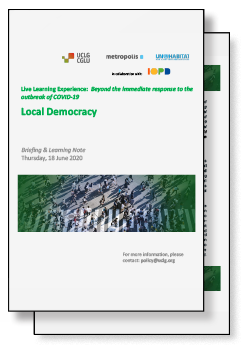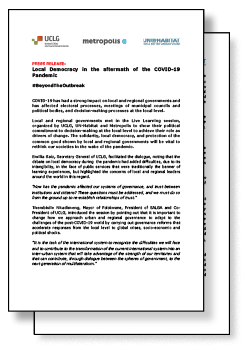Local Democracy
UCLG Secretary General
Mayor of Polokwane, President of SALGA and Co-President of UCLG
Secretary General of Metropolis
UN-Habitat Regional Representative for Latin America and the Caribbean
Mayor of San José and Co-President of UCLG

Context

Local democracy, as every other aspect of urban life, has been dramatically disturbed with the current health crisis and consequent measures to promote a healthy and safe environment. All forms of political gathering have been either cancelled, postponed or taken to virtual platforms. The exceptional state brought by the crisis has often made way for flexible interpretation of laws and created opacity in processes that should be transparent and open. The need to rapidly respond to urgent issues has in many ways made visible the potential to streamline bureaucratic procedures, but it has also been used as a pretext to apply alternative processes that do not necessarily abide to democratic and transparency rules. While the safety of the population should be the utmost priority at a time of crisis, guaranteeing the safety of our democratic institutions is equally important. Local authorities now face the challenge of balancing the benefits and risks that come with the newly established democratic processes and increased use of technological tools. The digitalization of participatory decision-making processes presents itself as a great opportunity to reach a wider portion of the population, but comes with the challenge of educating citizens and public servants on how to manage it. Tracking citizens’ health data sounds promising to prevent new outbreaks, but it comes with many privacy concerns. In the aftermath of the crisis, cities will have to address many new challenges in terms of sustaining democratic structures. But they can also count on a newfound sense of community and civic participation as the crisis has served to spur citizen solidarity and active engagement with local issues. Finding ways to solidify these actions will be key to build stronger local institutions and tighter, more cohesive communities.
Challenges
According to a pre-COVID-19 report from International IDEA, both national and sub-national entities had been suffering a decrease in democratic quality, an erosion observed also for high performing democracies. With the outbreak, cities have expressed concerns about national governments undermining local powers with the excuse of efficiency and security. In that sense, while there is a general understanding that extreme circumstances require extreme measures, there is also a strong concern that this approach will prevail beyond the outbreak. Additionally, local and regional governments will face the challenge of an increase in poverty and inequality, which could lead to social unrest and distrust in public institutions. Finally, cities must find an approach to use digital technologies to promote safety and public health while fostering citizen participation and its related issues. An increased challenge is to promote collective deliberation facing society atomization, a deep digital divide based on socio-economical and geographical differences, together with widespread privacy concerns. As there are no simple answers to these questions, engaging the civil society in the debate will be fundamental in bringing solutions that address public concerns and help build trust in local institutions.
Needs

Now, more than ever, cities need to tackle inequality and guarantee the rights of the entire population, particularly of those most vulnerable, as a way to strengthen the social pact and build trust in public institutions. This requires a collaborative, participatory approach vis-à-vis the population – meaning that cities will need to guarantee a universal and equal access for all citizens to participate in decision-making processes, be it via physical or digital forms. On the other hand, while extreme circumstances call for assertive measures, governments must avoid authoritarian drifts, making sure that decisions are fact-based and take into account the opinion of experts but also the needs and concerns of the civil society. Finally, in a time of uncertainty, misinformation and unrest, cities need to implement open and transparent processes, an approach that reinforces trust in public authorities and helps build the sense of community and social cohesion.
Responses

Learn how Santa Fé has created neighborhood networks to promote mutual aid and reflection
The former governor of Nariño believes that solutions will come from defending the public sphere and the decisions for the majority
Grenoble has been focusing on adapting participatory budgeting to digital means, releasing a new mutual aid platform and reimplementing a citizen jury to fight against the isolation of the elderly
Responses

Learn how Santa Fé has created neighbor networks to promote mutual aid and reflection.
The region of Nariño believes that solutions will come from defending the public sphere and decisions for the majority, which must restart the system to create new citizens and governments with clear priorities
Grenoble has been focusing on adapting participatory budgeting to digital means, releasing a new mutual aid platform and reimplementing a citizen jury to fight against the isolation of the elderly:
Key Takeaways
- Tackling inequalities is a fundamental aspect of promoting cohesion and inclusion and preventing that the health crisis turns into a social one. In that sense, equal and universal access to public services and guaranteeing the right to the city to the most vulnerable communities will be the base upon which governments will build resilient societies and trust in public institutions, which will be very much needed in the aftermath of the crisis. Ensuring these values is a condition for democratic mechanisms to endure and consolidate in the midst of arising technocratic and authoritarian tendencies.
- Many cities and regions have managed to continue public service delivery and respond to the urgent health needs, supporting the safety and health of its citizens. Local authorities can leverage on the preeminence that the public sector and public workers have gained during the pandemic to build a relationship of trust and cooperation with all citizens.
- Cities and regions need to be rebuilt for and with citizens. Ensuring participatory democracy is fundamental to build more resilient societies and make sure no one is left behind. Citizens must be at the center of this process and must be engaged in an accessible, transparent and open way.
- Digital technologies have proven to be extremely useful in terms of connecting, informing and engaging with the community. While they can be incredibly democratic tools, governments must ensure universal access and training to such tools, in order to make sure that they do not worsen the economic and social gap. Digital technologies can be used to help keep the population safe and informed, but governments must ensure that this is done while preserving citizens’ human rights.
Beyond
The Outbreak

An increase in community solidarity and a rapid shift into digitalization in many spheres (education, health and access to public services, to name a few) are two of the main outputs of the crisis. Many cities are combining these two trends to create, improve or promote ways in which citizens can collaborate by connecting with each other via a virtual community. The International Observatory on Participatory Democracy (IOPD) has taken notice and aggregated a few of these initiatives on their website. From Barcelona to Montevideo to Ouagadougou, cities are leveraging the reach of digital platforms to foster local solidarity. An approach that we can hope to be even further developed as we prepare to rebuild our cities in the aftermath of the crisis.

Building
Back Better
The UCLG Decalogue

“Governments at all levels will need to ensure that data gathering and the development of artificial intelligence is used for the common good and that rights are guaranteed with involvement of communities and at the service of democratic societies. It is technologically possible and it should be our framework once the crisis is over.”
Resources

For further information on the topic of Local Democracy and its impact on cities and regions, please refer to the related resources included below.




